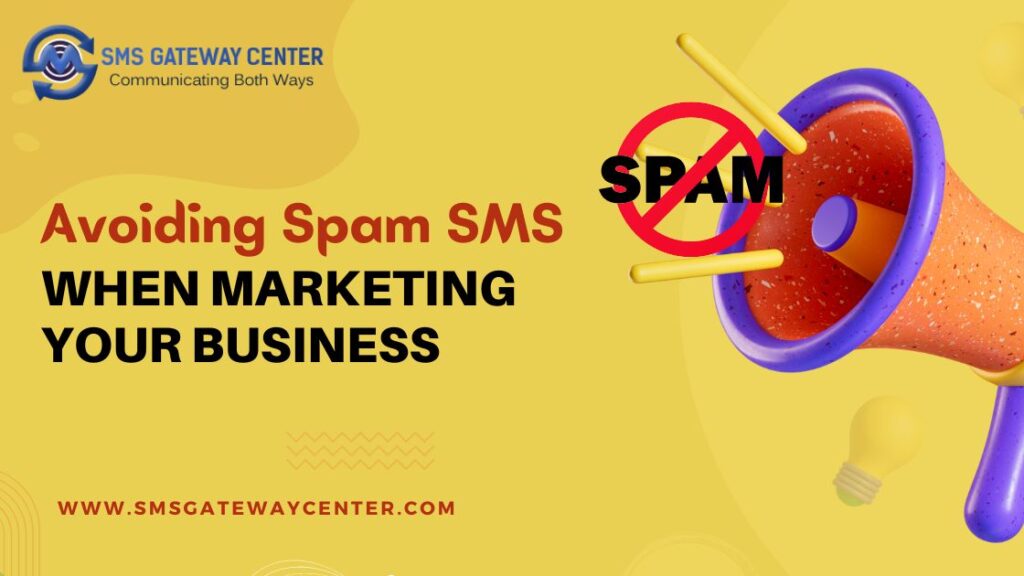Avoiding Spam SMS When Marketing Your Business
Spam text messages are a scourge. They’re annoying, they’re intrusive, and they’re often difficult to get rid of. But what if you’re the one sending them? You may be tempted to use Bulk SMS marketing to reach your customers as a business owner. After all, it’s a quick and easy way to communicate with large groups of people. But before you start sending out mass text messages, there are a few things you should know. In this article, we’ll give you some tips on how to avoid spam SMS when marketing your business.

What is Spam SMS?
Spam SMS is the act of sending unsolicited text messages. It’s an activity that’s been around since before the first cell phones came out. While it’s not illegal to send spam text messages (though in some countries, it is), it can have a negative impact on your business. First off, if you’re sending spam SMS to the wrong people, you could be getting yourself into some legal trouble. Second, if you’re sending spam text messages to your customers, you could be putting your reputation in jeopardy. What’s more, spam text messages could lead people to block your business’s phone number, which would make it hard for people to contact you.
How to Avoid Spam SMS When Marketing your Business
It’s always best to avoid sending spam in the first place. But if you really want to use SMS marketing to reach new customers, how can you do it without getting yourself into trouble? Here are a few tips to help you avoid Spam SMS when marketing your business.
- Start with the right equipment: Be sure to only send text messages from equipment that you own. Sending messages with someone else’s equipment could get you into trouble.
- Collect the right information: If you’re sending text messages to advertise your product or service, be sure to collect the person’s name and phone number. If you’re sending text messages to collect customer feedback, be sure to let your customers know that you’re collecting their information.
- Limit message frequency: When you’re sending an automated SMS campaign, be sure to program your system to limit the amount of times your message is sent.
- Stay away from certain topics: Some topics are more likely to get you into trouble than others. If you want to be safe, avoid sending text messages about health and wellness, financial products and services, and employment.
- Don’t send unsolicited messages: This is an important one. If you don’t have the person’s consent to send them a text message, don’t do it.
- Be careful about your wording: When you’re writing your text messages, be sure to avoid anything that could be construed as spammy.
- Keep records: As with any marketing campaign, you should keep track of how many people are receiving each message and how they’re responding to it.
- Be ready to respond: Just as with any other form of marketing, you should be ready to respond to customer inquiries as soon as possible.
- Know how to shut it off: Finally, you should know how to end your automated text message campaign.
The Importance of Consent
One of the most significant things you can do to avoid spam SMS when marketing your business is to obtain your customers’ consent. Whether you’re sending out automated messages or sending individual texts to select customers, you should always get your customers’ permission before sending bulk SMS to their phone numbers. You can do this by including a consent clause in your terms of service or by asking them to sign a consent form. What you’re looking for is verbiage that says something along the lines of, “I give permission to (your company) to contact me via text.” This will help you avoid Spam SMS complaints. What’s more, it could help your business avoid unwanted lawsuits.
How to Get Consent from your Customers
If you want to make sure your business avoids Spam SMS complaints, you should always get your customers’ permission before sending them a text message. But how do you actually do that? Let’s take a look at a few ways you can obtain consent from your customers.
- Place a consent clause in your terms of service: If you’re using automated text messages to communicate with your customers, the best place to obtain their consent is in your terms of service. Be sure to make it clear that you’ll be communicating with your customers via text messages.
- Ask customers to sign a consent form: If you’re sending out individual text messages to select customers, you can obtain their consent by asking them to sign a consent form. This is a good idea if you’re sending out promotional text messages.
Writing your SMS Messages
You’ve got your customers’ permission to send them text messages. Now it’s time actually to send the messages. Here are a few tips to help you write your SMS messages to make sure they don’t end up in your customers’ spam folders.
- Be clear and concise: Keeping your text message short and to the point can help you avoid Spam SMS complaints. People don’t want to read long messages when they’re driving or doing something else that requires their hands. Keep your messages short and to the point, and you’ll avoid being labelled as a nuisance.
- Include your business’s phone number: If you’re sending an automated message, be sure to include your business’s phone number. This way, people can call you if they want to stop receiving your messages.
- Avoid SMS spinner software: While these software programs can help you send out large amounts of text messages quickly, they can also lead to you being labelled as a spammer.
- Be careful with hyperlinks: If you’re linking to a website in a text message, be sure the link isn’t spammy or malicious.
- Don’t use all capitals: Avoid using all capitals in your text messages. It’s considered rude and could get you labelled as a spammer.
- Avoid SMS spook words: Some words are spookier than others. If you don’t want your messages to get caught in someone’s spam folder, you should avoid using words such as “free,” “savings,” and “discount.”
Monitoring your Results
If you want to avoid Spam SMS, you need to know how your customers are responding to your messages. For example, if you’re sending automated messages to get people to sign up for your SMS Contact list, you want to make sure they’re clicking on the link. If they aren’t, you’ll want to stop sending that message. If you’re sending individual text messages, you’ll want to monitor how your customers are responding to them. This can help you avoid sending too many messages to people (or too few). And if you’re sending text messages to collect customer feedback, you need to monitor how they’re responding. This can help you identify problems with your product or service and address them before they have a chance to get out of hand.

